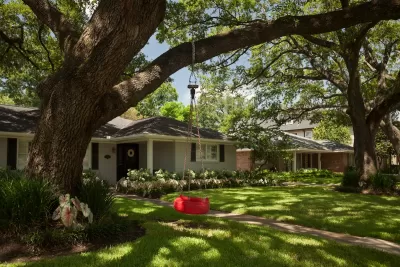The nonprofit model is becoming more popular as communities seek ways to reduce housing costs.

With housing costs spiraling out of control for many U.S. households, community land trusts and shared equity homeownership programs are growing in popularity, with over 300 land trusts nationwide.
In a piece for Route Fifty, Molly Bolan explains the model. “Land trusts are nonprofits that through a shared equity program purchase properties and then sell or rent the single-family homes, multifamily buildings or commercial spaces built on them. The trust retains ownership of the land the house sits on.” Unlike more predatory models (see investor-owned mobile home parks), land trusts enter a long-term (often 99-year) lease, which can be transferred to new owners should the first homeowners decide to sell.
“Nationwide, nearly 88% of people who own their homes through a shared equity program are first-time buyers, according to Grounded Solutions Network. The model offers social benefits too, like mitigating gentrification and reducing racial gaps in homeownership.” In Texas, the Florida Keys, and Lahaina, community land trusts are being used as a way to preserve affordable housing for residents in the wake of natural disasters.
Because scaling the land trust model can be costly, James Yelen, director of technical assistance for Grounded Solutions Network, warns that the suggests that cities should dedicate funding to supporting the model, pointing to examples in Oakland and Chicago. “Beyond dedicated funding, state and local governments can update laws to ensure community land trusts are eligible for affordable housing funding from programs like the federal Community Development Block Grant.” States, counties, and cities could also exempt community land trusts from property taxes to reduce their costs.
FULL STORY: Hungry for affordable housing, communities turn to land trusts

Alabama: Trump Terminates Settlements for Black Communities Harmed By Raw Sewage
Trump deemed the landmark civil rights agreement “illegal DEI and environmental justice policy.”

Study: Maui’s Plan to Convert Vacation Rentals to Long-Term Housing Could Cause Nearly $1 Billion Economic Loss
The plan would reduce visitor accommodation by 25% resulting in 1,900 jobs lost.

Planetizen Federal Action Tracker
A weekly monitor of how Trump’s orders and actions are impacting planners and planning in America.

Wind Energy on the Rise Despite Federal Policy Reversal
The Trump administration is revoking federal support for renewable energy, but demand for new projects continues unabated.

Passengers Flock to Caltrain After Electrification
The new electric trains are running faster and more reliably, leading to strong ridership growth on the Bay Area rail system.

Texas Churches Rally Behind ‘Yes in God’s Back Yard’ Legislation
Religious leaders want the state to reduce zoning regulations to streamline leasing church-owned land to housing developers.
Urban Design for Planners 1: Software Tools
This six-course series explores essential urban design concepts using open source software and equips planners with the tools they need to participate fully in the urban design process.
Planning for Universal Design
Learn the tools for implementing Universal Design in planning regulations.
Caltrans
Smith Gee Studio
Institute for Housing and Urban Development Studies (IHS)
City of Grandview
Harvard GSD Executive Education
Toledo-Lucas County Plan Commissions
Salt Lake City
NYU Wagner Graduate School of Public Service





























